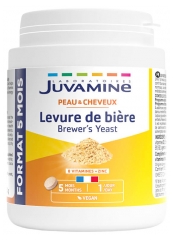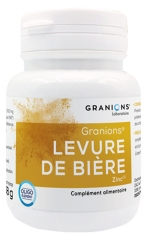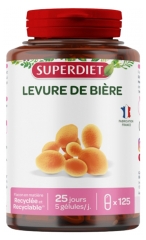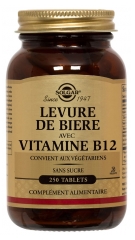What are the benefits of a brewer's yeast cure?
Written by Paul Musset, Doctor in Pharmacy | published on | updated on 27/06/2024

In order to have beautiful skin, favor the growth of hair and nails, or jazz up your intestinal microbiota, nothing like brewer's yeast. But what is it exactly?
Brewer’s yeast: what is it?
Brewer's yeast is a microscopic fungus whose scientific name is Saccharomyces Cerevisiae. « Saccharo » evoking sugar (like in « saccharose ») and « myces », fungus. « Cerevisiae » refers to beer, the ancestor of beer, which the Gauls made by fermenting barley or other grains or plants (except hops).
Under the microscope, this fungus seems like small round or oval cells. A 1 cm3 of compressed fresh yeast contains around ten billion cells. Saccharomyces Cerevisiae is a yeast which possesses very specific properties: it manages to survive between 0 and 55 degrees, with a pH level between 2.8 (very acidic) and 8 (basic). It is also able to withstand periods of desiccation (dryness) after which it can be activated again.
Like all yeasts, brewer's yeast can grow aerobically (with oxygen) and anaerobically (without oxygen). In the presence of oxygen and sugar, it "breaks" the latter (glycolysis), multiplies very quickly and produces water and carbon dioxide. In an anaerobic environment, it multiplies more slowly, but produces alcohol in addition to carbon dioxide. It is due to this property that it has been used since ancient Egyptian times right until today, and now it is used to create beer.
Did you know?
Certain strains of Saccharomyces Cerevisiae are used to make bread: this is known as baker’s yeast. This gives the bread a different taste compared to sourdough bread (which ferments without any added yeast), whose fermentation is lactic and non-alcoholic.
Brewer’s yeast, an exceptional composition
Brewer's yeast is 40% protein in the form of amino acids. These represent 7 of the 9 essential amino acids, which we definitely need: leucine, isoleucine, methionine, phenylalanine, valine, tryptophan, and threonine. In this regard, it is almost as interesting as the famous spirulina, from the nutritional viewpoint.
Brewer's yeast also contains many minerals such as calcium, copper, iron, magnesium, sulfur, potassium ... What gives brewer's yeast a worthy reputation is its exceptional richness in vitamins B groups: B1, B2, B3, B5, B6, B8, B12. They are all present in generous quantities! Vitamin B8, also known as vitamin H, takes part in the synthesis of keratin, the main component of hair, nails, and the upper layer of the epidermis.
Through what form is it consumed?
Brewer's yeast exists in the form of dry brewer's yeast (sprinkles, tablets) or revivable (capsules, sachets, etc.). In the first case, it is heated at a high temperature and isn’t active anymore but retains all of its nutrients. In the second scenario, it is active yeast which is simply stabilized by heating at less than 40 degrees. In contact with humidity, yeasts resume their natural metabolism.
What are the properties of brewer’s yeast?
The high protein content of brewer's yeast is interesting when it’s part of a vegetarian diet, as a supplement. Vegetarian diets, and even more so vegan, which often lacks vitamin B12 and is mainly found in animal products (especially organ meats and shellfish, but also fish and meat). However, this vitamin which is present in brewer's yeast, is vital for several body functions mainly for the good health of the nervous system.
Vitamins of group B mainly B8, strengthens hair and nails and enhances the skin. Brewer's yeast is an effective ally while fighting against acne and boils.
It is also a probiotic in its revivable form, which is beneficial for the intestinal microbiota. A brewer's yeast cure for a few weeks can help restore and strengthen the immune system and the intestinal flora, especially after gastroenteritis or an antibiotic treatment.
It can help fight constipation, diarrhea, and bloating, although treatment can cause these same symptoms for the first few days. However, you need to be careful and not consume the latter, in the case of intestinal disease (such as Crohn's disease) or weak immune defenses (for example during chemotherapy). It could then pass the intestinal barrier and enter the bloodstream, which leads to infections..
In case of pregnancy, consult your doctor or pharmacist before consuming live yeast.
Brewer's yeast for four-legged buddies
Cats and dogs also deserve healthy, less itchy skin and beautiful, fluffy, shiny hair! You can give them brewer’s yeast to take care of their coat in the form of flakes which are sprinkled on their food, or tablets (1 tablet for 10 kg). Generally, there are no contraindications and aren’t a danger to animals, who will also benefit from this precious supply of B vitamins!
How to enhance your skin and hair with brewer's yeast?
There are various ranges of brewer's yeast depending on their use: brewer’s yeast to beautify the skin and brewer’s yeast to strengthen hair and nails. The maximum amount of yeast you can consume on a daily basis is just a few grams You can use all the benefits of brewer's yeast through your hair, skin, and nails in several manners:
- Internally, by distributing a dose of about 5 to 6 grams of yeast during the day, during meals. In the form of sprinkles, it can be sprinkled on yogurt or salads. If you don't like the taste, favor tablets or capsules.
- Through external application: you can make brewer's yeast masks for your hair, your skin or your nails. To do so, activate revivable by putting it in some lukewarm water for 15 to 30 minutes, then apply the paste obtained by massaging it to the hair, face, or nails. Rinse after 20 minutes. If your skin is rather dry, you can add an egg yolk and/or some vegetable oil (olive, argan, coconut ...) to your paste.
Make the most all the virtues of brewer's yeast, to resume strong and shiny hair, glowing skin, resistant nails and easier digestion!
The three key points you need to remember about brewer's yeast:
- Brewer’s yeast is a single-celled microscopic fungus, which has been used since Ancient times, for its fermentative potency;
- Dry brewer's yeast is heated at a high temperature. There are no more living cells, but all the nutrients are retained. It is great for the hair, skin and nails;
- Active or revivable brewer’s yeast is a living yeast which also possesses a probiotic action. It is very useful for improving the intestinal microbiota, as a treatment of two or three months, which needs to be renewed once or twice a year.





















